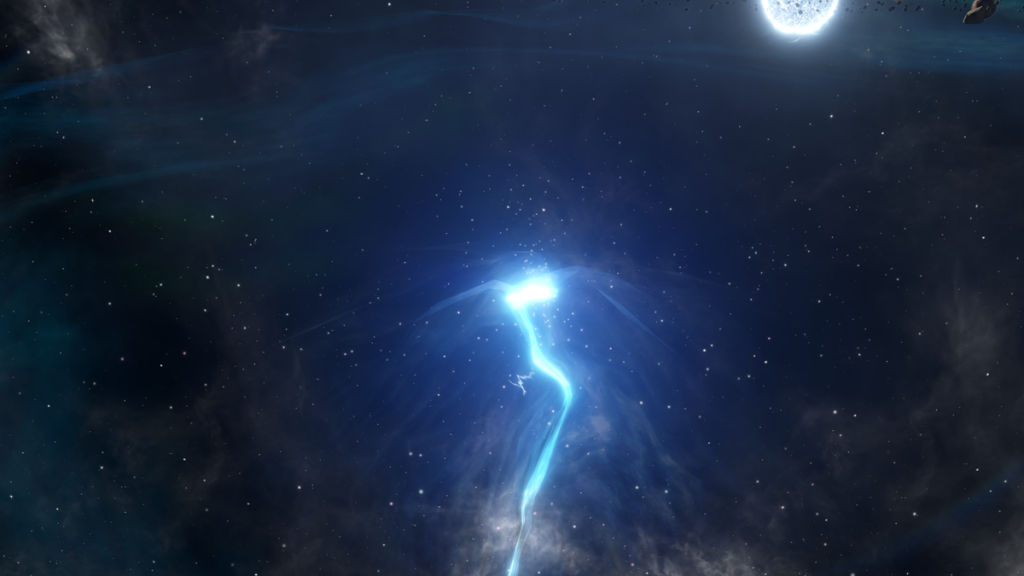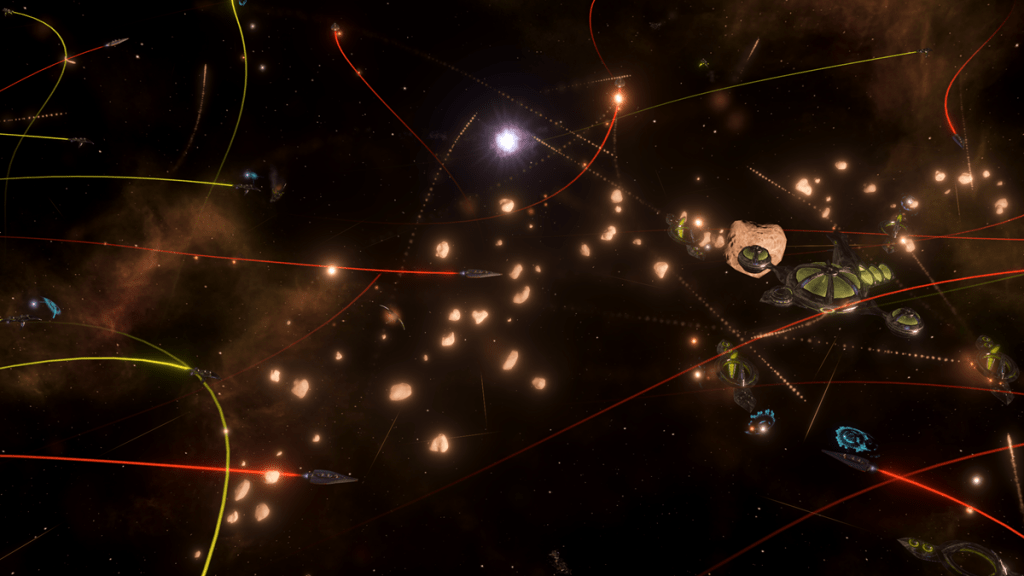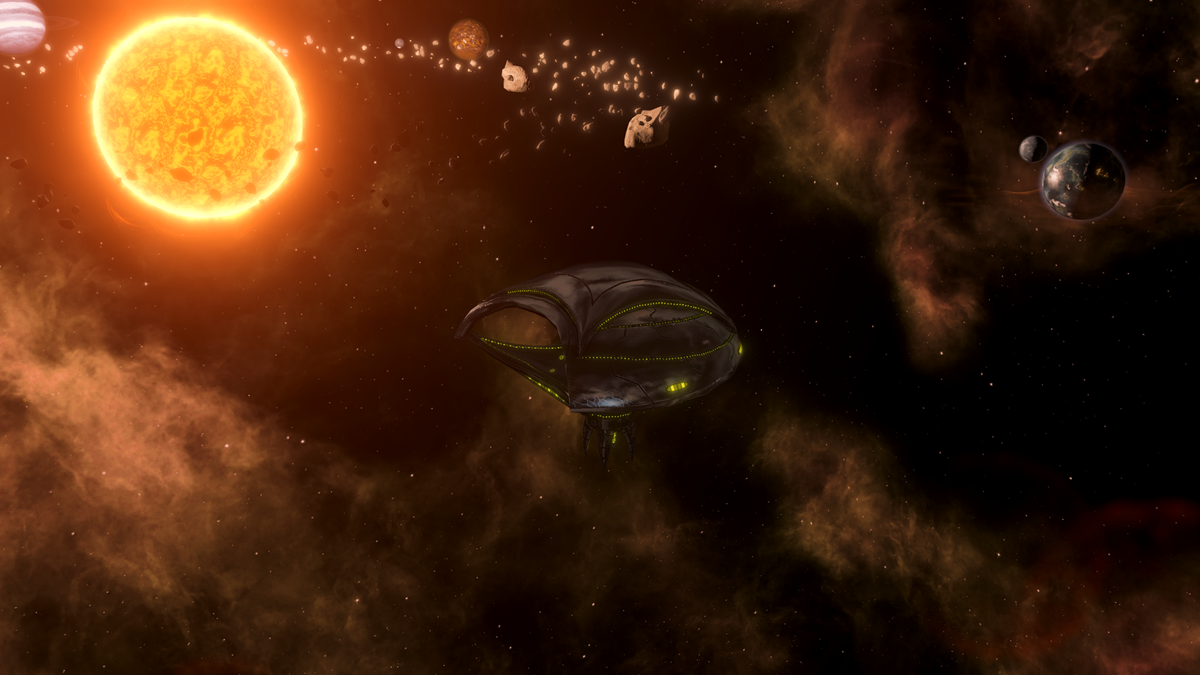It’s hard to believe we’ve had 8 years of Stellaris, but it’s true. Since releasing back in 2016, Stellaris has nine core expansions, a single narrative expansion (Astral Planes), and about a dozen content packs including story-specific content and new playable species. The newest expansion, Stellaris: Cosmic Storms, adds new dynamic Cosmic Storms that affect gameplay, a new Origin, Storm Chasers, 3 new Civics, and some new technologies built around the new storm mechanic. Through and through, it’s more Stellaris, which is always a good thing.

Stellaris: Cosmic Storms (PC [Steam], [Microsoft Store], [GOG])
Developer: Paradox Development Studio, Behaviour Rotterdam
Publisher: Paradox Interactive
Released: September 10, 2024
MSRP: $12.99
Into the Eye
As the title of the expansion would suggest, Stellaris: Cosmic Storms‘ main big new feature are its new dynamic cosmic storms. There are eight unique storms in total: Electric, Particle, Gravity, Magnetic, Radiant, Stardust, Shroud, and Nexus. These storms completely replace the old existing Space Storms, which were rather inconsequential in their former structure.
Let me start by saying, each of these storms are absolutely stunning graphically. Most of them add a swirling particle effect of colors that really light up entire systems, often with chaotic flashes of lightning and other cosmic explosions throughout the storm as it circles an area.
Each storm has a general effect that affects your systems in the storm, regardless of the actual storm type: +0.2Monthly Devastation to your planets and increased Emergency FTL Damage Risk, but then there is a slew of other pros and cons based on which of the eight storms it is. For example, a Magnetic Storm increases station and ship upkeep but reduces Metallurgist Upkeep.
As you can imagine, depending on where the storm hits, what sort of empire you’re building, and what stage of the game you’re in, the storm can be a huge headache, a nice buff, or rather meaningless. In the end, I think that the biggest issue I have with the storms, is depending on when and where they hit really changes how big of a deal they actually are, but of course, that’s the intent.
An all-new ascension perk, called Galactic Weather Control, allows you to generate Cosmic Storms manually using your Science Ships. This can be a pretty big boon if you have cloaking technology researched and placed on your Science Ships, because you can cloak into enemy territory and start generating some destructive storms.
One of the biggest problems with the storms is their duration. In most cases by the time I start to move things around to try and optimize the impact of them hitting, the storm ends and I’m just left with the aftermath effects, not the meaningful modifiers that existed why they were raging on. I get wanting the storms to have a more randomized and unpredictable effect, but I feel like there needs to be a bit of a balancing act between their randomness and being able to capitalize on them.

I have a feeling we’re not in Kansas anymore
Anytime I see a new Stellaris expansion get announced, I quickly look to make sure there’s a new Origin I can look forward to trying it. In Cosmic Storms, Storm Chasers is that new origin. Traditionally speaking in Stellaris, some Origins are big gameplay changers, paving the way for unique builds that can really add some new build potential. Others, however, are more story-focused or even just provide some unique mechanic that add a new element of gameplay to the core Stellaris experience.
I’m no min-max expert at Stellaris, but the Storm Chasers origin feels like more of a flavorful narrative origin than one of the game-changing options. Going with Storm Chasers gives you a weather map overlay to track cosmic storms, as well as see their effects. As you advance through technology, the map improves, eventually even showing you forecasts so you know when and where storms will hit certain systems. You become a galactic meteorologist, essentially.
You also get a few storm-focused benefits like an increased chance for storms to spawn in your borders, a higher chance of getting storm-related research options, and more unity per storm building that you build. However, being a fearless Storm Chaser also results in a shorter lifespan for your leaders, and they are less effective in council positions. In return, your entire species gets a trait called Storm Touched, which adds 10% of resources from Jobs, and reduces Amenity usage by 10%. The benefit certainly outweighs the negative, but it’s certainly no game-changer like Clone Army, Necrophage, or Progenitor Hive.
It’s a cool origin option if you really want to have some insight into the new Cosmic Storms as they work their way across the galaxy, but the benefits pale in comparison to some other origins, which is why I think this is more of a fun option than an impactful one. Storm Chasers almost feels like an origin dedicated to going, “Hey, let’s go full-fledged into seeing what’s new with these storms.”

Riding the galactic waves
In the end, Stellaris: Cosmic Storms is a very unique DLC, for better and worse. The new storms certainly add a new element that you’ll have to learn and adapt to while playing. But in a lot of ways it ends up just adding some more difficulty, and in some cases tedium. For veteran players, I imagine the added difficulty will be appealing to shake up the game, but at the same time, I can’t help but wonder if some players will simply opt to disable this DLC unless they really want to do a playthrough with the storms enabled.
The beautiful visuals of the storms single-handedly elevate the Stellaris experience, and I can see some real potential from the new storm system if Paradox continues to build on and expand it, adding more opportunities to earn rewards for properly handling the storms or even making it a more streamlined risk/reward system. But in its current form, Cosmic Storms falls a bit short of being a “must-have” Stellaris expansion like Utopia, or Apocalypse. That being said if you’re like me and just always want more Stellaris, there are plenty of entertaining layers in Cosmic Storms to make it a worthwhile addition to your the best grand strategy space game on the market.
[These impressions are based on a retail build of the game provided by the publisher.]








